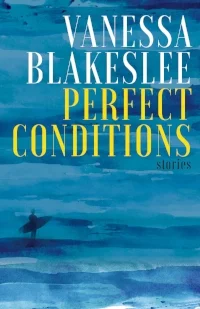Paradise Lost
In Vanessa Blakeslee’s short stories, the only certainty is language. Nothing else is bolted to the ground; as if on a seafaring vessel, most other elements of Perfect Conditions, her second collection of short stories, sway and shift. But Blakeslee’s sentences are invariably as clean and sharp as surgical steel. Her topics veer from nervous apocalyptic scenarios in America to a spooky magical clinic in Guatemala, and her characters range from smart, flawed women to hapless, lovable men. One thing these stories mostly have in common is the exotic: not exoticism, but the exotic, in the dictionary-definition sense of the word. Most of the lives and settings in this book are out of the ordinary in a bewitching way, whether the protagonists are surfers, saviors, or both.
Perfect Conditions, Vanessa Blakeslee. Curbside Splendor, August 2018. 300 pp.
There’s also a peculiar balancing act going on in this collection. Of the ten stories, five are focalized through women and five through men. Three stories concern themselves with postapocalyptic situations, three stories primarily regard surfing, and the remaining four all relate to unusual journeys. The topics of these stories, which connect to each other in compelling lines of flight, are distributed across the collection so that the reader moves back and forth regularly between topics, making each seem fresh. The balance represented here is uncanny.
The stories stumble only in spending time on narrators who are not especially interesting. The protagonist of “Stand by to Disembark,” for instance, is a young man with no significant accomplishments or clear motivations. His position aboard a deep-sea fishing trawler, and the dramatic and technical details attached to that life, are what make him interesting to read about, rather than his inherent characteristics. Similarly, “Arthur and George: The Voyage Begins” focuses on two middle-aged schlubs, each with desires and secrets, neither of whom has a lot of light to shed on the human condition. Blakeslee makes the story about failure, a theme few writers dare to tackle, and that’s interesting in itself; however, it’s just not enough to sustain 15 pages of average, middle-aged male anxiety.
When Blakeslee sticks to the exotic, though, she succeeds beautifully. “Sustainable Practices,” for example, uses short sections headed by corporatespeak and shuddery Instagram hashtags to wind together the uglinesses of blithe tourism and unethical business practices. There’s failure in this story, too, but the real theme (pervasive in the collection, in fact) is disillusionment. The reader may know what Nina, honeymooning in Tahiti, is going to find when she tries to tour a water bottling plant. But the story’s treatment of Nina’s slow awakening to how corporate exploitation works, and what life is really like in “paradise,” is not mocking or impatient. It’s gentle, based in writing craft, using images to accomplish what might otherwise be lectures:
As Nina and the reader both learn, cute hashtags don’t often survive overseas travel, unless the traveler is rich or naïve enough to insulate herself. None of the characters in Perfect Conditions are rich, and few of them remain naïve. The final story, “Exalted Warrior,” is a daring choice to close the collection, as it is essentially O. Henry filtered through Philip K. Dick. Hence, depressing. But the characters certainly have learned what their world is made of: bad bargains and Handmaid’s Tale-level oppression.
For whatever reason, Blakeslee appears most comfortable writing about surfing. She uses lingo easily, writes with authority about the best spots in the world to compete and enjoy waves, and treats pro surfers and American surf bums living on distant beaches as citizens with totally ordinary pursuits. “Splitting the Peak,” the longest story in the collection, traces an impossible love between two professional surfers across a decade. In a crash of genres as unexpected as the one in “Exalted Warrior,” the story mimics an Edith Wharton novel in its turns and emotional textures (clearly enough that Wharton’s work is mentioned within), while its physical details are all about surfing. “Every surfing story is a love story,” one of the characters claims. Perhaps so. Blakeslee’s love for the sport is evident in the stories she writes about it.
But the stories are most absorbing when they work with disillusionment and desperation. The characters need not be desperate to fight death or overturn an unfair world; perhaps they only want to connect with a dissolute son (“Perfect Conditions”), or test their resolve against an apparently crumbling world (“The Perfect Pantry”). An X-ray of these stories reveals that Blakeslee is invested in mixing old story models with contemporary interests. She knows how to write a Raymond Carver story about a post-nuclear landscape, for instance. And the language she uses is always so precise, so confident, that the reader feels unprepared for the heartbreak she sows into the lives of her characters. The best of the collection shows people rationally going about actions that will bring on terrible consequences. Blakeslee rarely pulls her punches; the world and the forces at work in it are usually mysterious and disappointing. Even if life is sometimes beautiful, at sunrise, by the ocean.
header image: "surf," cindy tunstall / flickr




